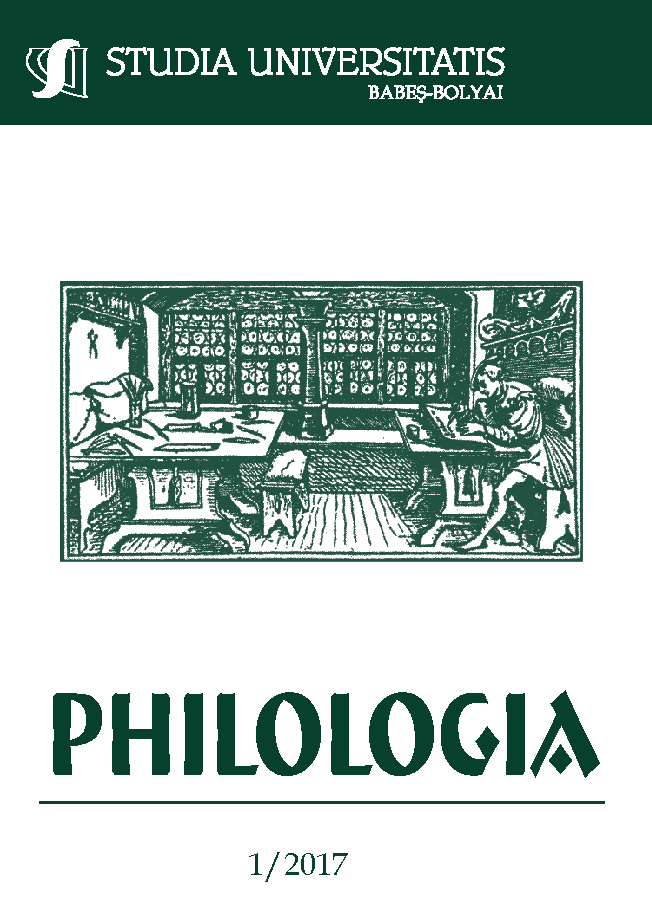HYPHENATED IDENTITIES IN CRISTINA GARCÍA’S “DREAMING IN CUBAN” AND “THE AGUËRO SISTERS”
DOI:
https://doi.org/10.24193/subbphilo.2017.1.11Keywords:
Cristina García, Cuban American fiction, hyphenation, identity, trauma, ethnicity, “1.5” generation.Abstract
Hyphenated Identities in Cristina García’s Dreaming in Cuban and The Agüero Sisters. The two novels analysed here are organically connected by their exploration of the effects of the Cuban Revolution on the families divided by their political allegiances and their experience of that revolution. The present study investigates the author’s personal journey towards understanding her own hyphenated identity as a “1.5er” reconciling her own conflicting impulses and cultural identities, using writing as a means to heal herself and others through an on-going interrogation of all aspects that help configure communal and personal identity and exploring their interdependence, in fascinating and intriguing tales of survival and atonement.
REZUMAT. Identități cratimate în romanele Dreaming in Cuban și The Agüero Sisters ale Cristinei García. Cele două romane analizate aici sunt legate organic prin explorarea efectelor Revoluției Cubaneze asupra familiilor divizate de loialitățile lor politice și modul în care au trecut prin revoluție. Studiul de față investighează călătoria personală a autoarei către definirea propriei identități împărțite ca reprezentantă a generației „1,5”, reconciliind propriile impulsuri și identități culturale conflictuale, folosindu-se de scris ca modalitate de a se vindeca și a-i vindeca și pe alții printr-o interogare continuă a tuturor aspectelor care conturează identitatea personală și pe cea a comunității, explorându-le interdependența, în povești fascinante și provocatoare despre supraviețuire și împăcare.
Cuvinte cheie: Cristina García, literatura cubanezilor americani, cratimare, identitate, traumă, etnicitate, generația „1,5”.
References
Alvarez Borland, Isabel. Cuban-American Literature of Exile: From Person to Persona. Charlottesville & London: University Press of Virginia, 1998. Print.
Anzaldúa, Gloria. Borderlands/La Frontera. The New Mestiza. 3rd ed. San Francisco: Aunt Lute Books, 2007. Print.
Davis, Rocío G. “Back to the Future: Mothers, Languages, and Homes in Cristina Garcia’s Dreaming in Cuban.” World Literature Today, vol. 74, issue 1, 2000, pp. 60-67, Print.
Eakin, Paul John. Fictions in Autobiography. Studies in the Art of Self-Invention. Princeton, NJ: Princeton University Press, 1985. Print.
García, Cristina. Dreaming in Cuban. New York: Ballantine Books, 1992. Print.
——. Interview with Iraida H. López. “And There Is Only My Imagination Where Our History Should Be: An Interview with Cristina García.” Bridges to Cuba/Puentes a Cuba, edited by Ruth Behar. Ann Arbor: University of Michigan Press, 1995, pp. 102-114. Print.
——. The Agüero Sisters. New York: Alfred Knopf, 1997. Print.
——.Interview with Bridget Kevane and Juanita Herrera. “At Home on the Page. An Interview with Cristina García.” Latina Self-Portraits: Interviews with Contemporary Women Writers, edited by Bridget Kevane and Juanita Herrera. Albuquerque: University of New Mexico Press, 2000, pp. 69-82. Print.
——. Interview with Jessica Murphy. “The Nature of Inheritance.” www.theatlantic.com, April 2003. Accessed 25 November 2015. Web.
——. Interview with Ylce Irrizary. “An Interview with Cristina García.” Contemporary Literature, vol. 48, issue 2, pp. 175-94, 2007. Print.
Guerra, Lillian. “Elián González and the ‘Real Cuba’ of Miami: Visions of Identity, Exceptionality, and Divinity.” Cuban Studies 38, edited by Luis A. Pérez, Jr. Pittsburgh, PA: University of Pittsburgh Press, 2007, pp. 1-25. Print.
Kevane, Bridget. Latino Literature in America. Westport, CT: Greenwood Press, 2003. Print.
Marmolejo-McWatt, Amparo. “Blanca Mester as Ochún in The Agüero Sisters.” Afro Hispanic Review, vol. 24, issue 2, 2005, pp. 89-101.
Pérez Firmat, Gustavo. Life on the Hyphen: The Cuban-American Way. Revised edition. Austin: University of Texas Press, 2012 (1994). Print.
——. “The Spell of the Hyphen.” Cuban-American Literature and Art. Negotiating Identities, edited by Isabel Alvarez Borland and Lynette M. F. Bosch. Albany: State University of New York Press, 2009, pp. 15-30. Print.
Rivero, Eliana. “Writing in Cuban, Living as Other: Cuban American Women Writers Getting It.” Cuban-American Literature and Art. Negotiating Identities. Edited by Isabel Alvarez Borland and Lynette M. F. Bosch. Albany: State University of New York Press, 2009, pp. 109-125. Print.
Rumbaut, R.G. “The Agony of Exile: A Study of the Migration and Adaptation of Indochinese Refugee Adults and Children.” Refugee Children: Theory, Research, and Services, edited by F.L. Ahearn, Jr. and J.L. Athey. Baltimore, MD: The Johns Hopkins University Press, 1991, pp. 53–91. Print.
Schutte, Ofelia. “Negotiating Latina Identities.” Hispanic/Latinos in the United States: Ethnicity, Race, and Rights, edited by Jorge J. E. Gracia and Pablo De Greiff. London and New York: Routledge, 2000, pp. 61–75. Print.
Downloads
Published
How to Cite
Issue
Section
License
Copyright (c) 2017 Studia Universitatis Babeș-Bolyai Philologia

This work is licensed under a Creative Commons Attribution-NonCommercial-NoDerivatives 4.0 International License.





 ©Studia Universitatis Babeş-Bolyai Philologia. Published by Babeș-Bolyai University.
©Studia Universitatis Babeş-Bolyai Philologia. Published by Babeș-Bolyai University.